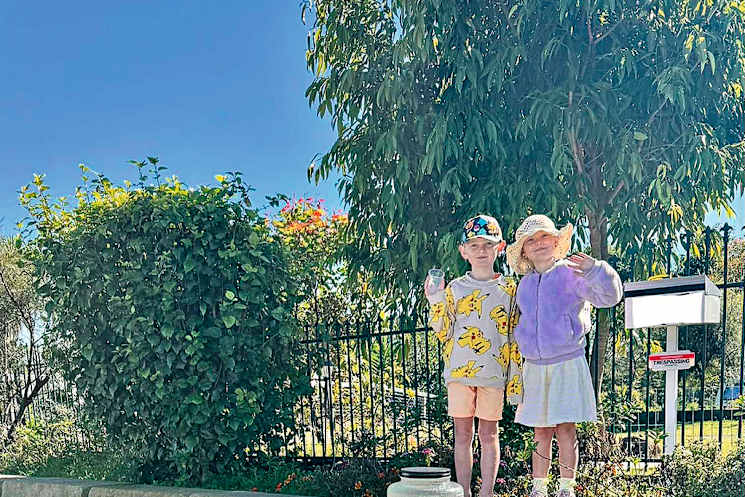
Griffin and Phoenix Fitzsimmons at their homemade lemonade stand.
WHEN Terrie Griffin’s children wanted to turn a goldfish bowl into an axolotl tank, she told them the money had to be earned.
While plants and rocks aren’t that expensive, it was the lesson and learning behind the earning that was important.
Terrie spent 25 years in the Australian Army and is the youngest of seven children.
She wants her children to understand the value of hard work and not have things handed to them.
Her daughter Griffin and son Phoenix were born a year apart, but were raised as if they were twins.
But how to earn money?
The family brainstormed and decided it made sense to do something that made use of the fruit growing on citrus trees in their garden.
A lemonade and fruit roadside market stall was the business plan they settled on.
“We have a lot of citrus trees in our garden. There are lemons, limes, oranges, mandarins and grapefruit,” she said.
“What they used the lemons for was to make lemonade and they put oranges and all the other loose fruit out up on the table to sell as well.
“Their tank was set up for goldfish and had Lego ornaments and other things inside it.
“When a neighbour gave them an axolotl, they decided what was in the bowl wasn’t suitable.”
The axolotl is native to Mexico and in the words of the Natural History Museum, are friendly faced salamanders that stay in their ‘tadpole’ form forever.
The siblings needed plants and wood in the aquarium for the axolotl to climb on and hide under, but the children didn’t have money.
“I told them money is quicker to spend than it is to make,” she explained.
“I’d taken a couple of buckets of lemons from the tree to their school to see if any of the mums or teachers wanted them.
“There were quite a lot left over, and my son decided to make lemonade.
“That was when the idea for a lemonade stall happened.”
The children initially thought they could just set up and start selling the lemons to the public.
“I told them preparation was needed and showed them how to make a sign to advertise what they were selling,” she said.
“Then came buying sugar and getting change from the bank.
“They had to buy cups that were the same size and once all that was done, they began selling their lemonade.”
It was a plan filled with lessons because at first the children wanted to sell their lemonade for $5 a cup.
“I said a better price was $1 a cup because if they made it affordable people might want to buy more,” she said.
“It also made it easier for them to work out how many cups they’d sold and how much money they’d earned.”
Terrie said the children’s enterprise helped make use of their garden’s surplus fruit.
They earned enough for their axolotl’s tank but more than that, they experienced the benefit of their hard work.





